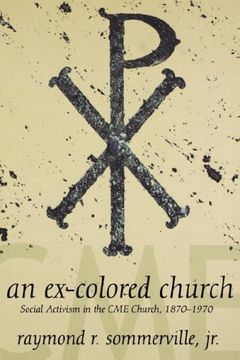Share
An Ex-Colored Church
Raymond R. Jr. Sommerville (Author)
·
Mercer University Press
· Paperback
An Ex-Colored Church - Raymond R. Jr. Sommerville
Choose the list to add your product or create one New List
✓ Product added successfully to the Wishlist.
Go to My Wishlists
Origin: U.S.A.
(Import costs included in the price)
It will be shipped from our warehouse between
Monday, July 01 and
Friday, July 12.
You will receive it anywhere in United Kingdom between 1 and 3 business days after shipment.
Synopsis "An Ex-Colored Church"
The Christian Methodist Episcopal Church was an important part of the historic freedom struggles of African Americans from Reconstruction to the Civil Rights movement. This fight for equality and freedom can be seen clearly in the denomination's evolving social and ecumenical consciousness. The denomination's very name changed from "Colored" to "Christian" in 1954, but the denomination did not join the struggle late. Rather, the CME was a critical participant from the days following the Civil War. At times, the Church was at odds with their white Methodist counterparts and in solidarity with other African-American denominations on issues of racial desegregation and the role of social protest in religion.Raymond Sommerville's important book discusses the relationship between Martin Luther King, Jr. and the Southern Christian Leadership Conference and the CME. While King and others received most of the headlines during the Civil Rights Era, the CME proved to be involved at all levels and equally important in all they did. With its strategic location in the South and its long history of ecumenical involvement, the CME Church emerged as a leading advocate of ecumenical civil rights activism. Previous interpretations asserted that the CME was apolitical and accomodationist or that it was more progressive than it was. Sommerville presents a more nuanced account of how a church of largely former slaves emancipated itself from the constraints of white Methodist paternalism and Jim Crow racism to emerge as a progressive force of racial justice and ecumenism in the South and beyond. Sommerville examines major centers of the CME -- Nashville, Birmingham, Memphis, Atlanta -- and selected leaders inthe South in charting the gradual metamorphosis of the former CME as a largely nonpolitical body of former slaves in 1870 to a more politically active denomination at the apex of the modern Civil Rights movement in the 1960s.
- 0% (0)
- 0% (0)
- 0% (0)
- 0% (0)
- 0% (0)
All books in our catalog are Original.
The book is written in English.
The binding of this edition is Paperback.
✓ Producto agregado correctamente al carro, Ir a Pagar.

